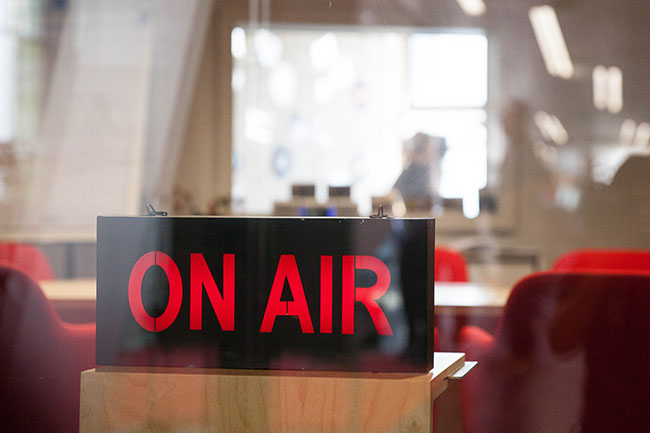Media Management
Bachelor programme
More courses from the department
Media & Digital TechnologiesStudy Media Management
Combine expertise in media and economics with basic journalistic competencies for print, radio, TV and online. In addition to a solid theoretical education, the practice labs provide you with the necessary practical know-how for a beneficial cooperation with journalists.
Add business and management skills to the mix and receive the ideal preparation for a business activity in media companies – graduates will be among the most sought-after specialists in the media realm.

Information, Links and Downloads
More than 25 Years of Experience
We have been shaping the media world for more than 25 years! Learn how.
FAQ
How much journalism is involved in the study programme?
An understanding of the basics of journalism is essential for many media professions. This is why we have experts teach practical journalism basics as soon as in the first two semesters.
In the second year, you can put your acquired knowledge into practice by applying it to various types of media in practice labs.
In addition, you gain insights into how to
- generate content using AI,
- conduct investigative research, and
- acquire content from third parties or sell contents or licences to them.
- Optional subjects such as “Political PR and Journalism” are ideal for experiencing the difference between public relations and journalistic work.
How important is marketing in this programme?
Marketing plays a major role in the media sector – not least in order to sell media products to the intended target group in the best possible way.
- Brand management is decisive for optimally positioning products and services.
- Sales and negotiation are important marketing skills that you acquire in practice labs and in the course “Professional Skills”.
- In the economic subjects, you learn more about pricing, communication controlling, and performance measurement.
If you like, you can additionally specialise in the marketing topic by choosing the relevant electives.
- One opportunity to do this is the course “Ad Design and Creation” in the third and fourth semesters. This is where you dive deeper into social media and cross-media strategies as well as content creation. Alternatively, you can focus on key account management and sales.
- Or you can dedicate a full semester to content marketing projects in your final year – under professional supervision.
Which projects do students carry out during this programme?
Every semester of this study programmes encompasses a wealth of diverse projects. Starting from the first semester, you work on at least one big project per semester during the “How to…” weeks. These periods cover two project weeks each at the end of the first four semesters. Your customers come from the practical realm.
The range of topics includes
- entertainment
- news
- interactive media
- the organisation and implementation of workshops for imparting media competencies to school pupils
In the practice labs in the second year, you create media projects in the media types of TV/video, radio/podcast, print/magazine, and online that are ready for publication.
A particular highlight is the fifth semester which is designed as a project semester. This means that a major project is the centre of attention – to such an extent that special, in-depth courses are developed surrounding the project.
Here you can gain an insight into our students’ creative projects.
Is Media Management a subject with a promising future?
Yes, Media Management has bright future prospects because the increasing digitalisation and globalisation will further reinforce the importance of media and content in society.
Our graduates work in media companies as well as in the media and marketing departments of companies wishing to use content for their own online formats, social media, or traditional media. In these contexts, the graduates pursue both creative and design or implementing activities.
The most important areas of activity along the value chain include
- the acquisition, creation, and production of content,
- dealing in content,
- programme design and packaging, and
- the distribution, sales, and marketing of media products, content, and services.
What does “media“ encompass?
In this study programme, you are introduced to the media landscape and its most important players and regulations. You become familiar with content formats for special and cross-media applications and create publication-ready content for
- radio/podcasts
- print/magazine
- TV/video
- social media / online / digital media
- the gaming sector
- the music business
We primarily address media that are used for entertainment, news, interaction, or knowledge transfer.
How much physical attendance is required?
The time requirement varies depending on which courses you are currently pursuing. In the first two semesters in particular, the focus is on theoretical content (basic studies).
On average, you should allow for approximately 20–25 hours per week for on-site courses and an additional 10–15 hours for independent study.
If you are well organised, you should have enough time to work alongside your studies. Many of our students are employed at a company with a scope of 8–10 hours a week.
